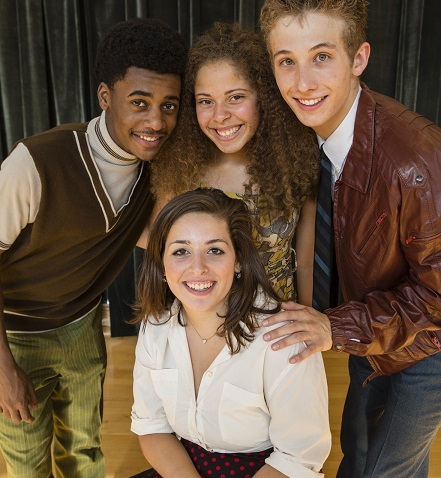by Robert W. McDowell
Triangle Arts & Entertainment
Hairspray’s irrepressible teenaged heroine Tracy Turnblad — the big girl with the big hair and the even bigger heart — is back. This time, local teenager Rachel Musson will play her in the July 16-20 PlayMakers Repertory Company Summer Youth Conservatory production of the 2002 Broadway musical based on the 1988 cult filmHairspray, written and directed by John Waters and starring actress and television talk-show hostess Ricki Lakeas Tracy Turnblad.
“I first came into contact with Hairspray as a kid when I first saw the 1988 John Waters movie on video,” recalls Seattle and the San Francisco Bay Area stage director Desdemona Chiang, who will put her youthful cast — aged 14-18 — through their paces in the Paul Green Theatre. She adds, “I was maybe 10 or 11 years old at the time, and saw it on VHS at a friend’s house because her older sister had rented it and was really into John Waters.”
Chiang says, “I was pretty young and naïve at the time, and so was a bit bewildered and fascinated by this outlandish campy story about a crass ‘plus-size’ girl who made friends with the black kids at her school during segregationist times and ends up overturning the beauty pageant and making a mess out of things. It was gritty, tacky, strange, a little gross, and surprisingly cool.
“I’ve never seen the stage musical performed (ever, anywhere), and I’ve never seen the new [2007] movie version of the musical” Desdemona Chiang confesses. “So, my impressions of the story are from that initial experience watching the 1988 film.”
Set in Baltimore, MD in 1962, Hairspray features music by Marc Shaiman, lyrics by Shaiman and Scott Wittmanand a book by Mark O’Donnell and Thomas Meehan. Hairspray made its Broadway debut, directed by Jack O’Brien and choreographed by Jerry Mitchell, on Aug. 15, 2002 at the Neil Simon Theatre, where it played for 2,642 performances before closing on Jan. 4, 2009. The show won eight 2003 Tony Awards®, including the Tonys for Best Musical, Best Original Score and Best Book of a Musical — and begat a 2007 motion-picture version of Hairspray, directed by Adam Shankman from a screenplay by Leslie Dixon.
Desdemona Chiang says, “Most people who’ve seen or heard of Hairspray know that it’s a fun musical with lots of great music, singing, dancing, cross-dressing, big hair, and pink glitter. It has a reputation for being a glitzy, rambunctious production that is a bit like cotton candy for the soul. What often gets over-looked is the deeper message of integration and social justice during a time when race was a very uncomfortable topic in America.Hairspray addresses issues I feel very deeply about — which is the marginalization, separation, and judgment of those who don’t have from those who do. The message is shrouded inside a sparkly musical-theater package, but it’s there.
“I think anyone who’s worked in the American Theater knows what it’s like to feel marginalized — to not be accepted by mainstream society because they’re not pretty enough, thin enough, rich enough, ‘normal’ enough, or because of their skin color, beliefs, or who they love. We all know what it’s like to not be the cool kid or the popular kid, or even the regular kid. And in a way, that’s what I love about Hairspray. It’s a story about misfits who band together under a common cause to become heroes. The fat girl gets the prince, the black kids dance on TV, and society’s ‘losers’ end up turning themselves into winners,” says Chiang.
When the curtain rises on Hairspray, says director Desdemona Chiang, “Tracy Turnblad (Rachel Musson), a ‘pleasantly plump’ teenager from Patterson Park High School, wants to become a dancer on ‘The Corny Collins Show,’ a local teenage dance program. Despite the skepticism of her plus-sized mother Edna (Jack Carmichael), Tracy gets support from her father Wilbur, (Ethan Fox), and goes downtown with her best friend Penny Pingleton (Lily Whitter) to audition. Velma Von Tussle (Sadie Frank), the racist producer of ‘The Corny Collins Show,’ rejects Tracy from the audition because of her size; and Tracy is teased by Velma’s daughter Amber (Ainsley Seiger), who is the lead female dancer on ‘The Corny Collins Show.’”
Chiang adds, “Back at school, Tracy is sent to detention for having an oversized and inappropriate hairstyle. There she meets black dancer, Seaweed J. Stubbs (Daniel Johnson), the son of the host of ‘Negro Day’ on ‘The Corny Collins Show,’ Motormouth Maybelle (Symone Crews). In detention, Seaweed teaches Tracy several new dance moves; and they soon become friends. She uses Seaweed’s dance steps at the Sophomore Hop the following day to introduce herself to Corny Collins (Andrew Cook). Impressed by the new moves, he gives her a place on the show. Tracy’s talent and dance skills soon make her a popular public figure.
“Later, at a platter party at Motormouth Maybelle’s record shop, Tracy rallies everyone to march against the station, because it is unfair to her that blacks and whites are not allowed to dance together. Tracy uses her popularity and the support of Motormouth Maybelle and the ensemble of black dancers to hold protests and eventually integrate dancers on ‘The Corny Collins Show,’” says Chiang.
In addition to director Desdemona Chiang, the creative team for the 2014 Summer Youth Conservatory presentation of the University of North Carolina at Chapel Hill’s professional-theater-in-residence includesPlayMakers Repertory Company producing artistic director Joseph Haj, producers Jeff Meanza and Jenny Wales, assistant to the director Griffin Gast, choreographer/associate director Matthew Steffens, music director/conductor Mark Lewis, assistant to the music director Camille Johnson, production manager Michael Rolleri, scenic designer Robin Vest, lighting designer Dominic Abbanante, costume designer Sarah Widgeon, sound designer/engineer Robert Dagit, and stage manager Sarah Smiley.
Besides music director/conductor Mark Lewis and his assistant Camille Johnson, the show’s musicians includeEvan Atherton (trumpet), Rebecca Clemens (trombone/bass), Morgan Davis (drums), Molly Frank (violin),Nate Huvard (electric guitar), and Matthew McClure (woodwinds).
“What is both exciting and challenging about this project is that we are creating it with an ensemble of teenagers, whose ages range from 14-18,” says director Desdemona Chiang. “It’s a play set in a high school, being performed by actual high school students. The production is very demanding on the actor, with heavy choreography and difficult harmonies in the songs. So, in addition to building the piece, we are also training these performers to increase their vocal and physical strength, stamina, and endurance. It’s been both an artistic and a pedagogical experience. The good news is that we are blessed to have a cast of young performers who are hungry and enthusiastic, so they are eager to tackle the work.”
She adds, “The Hairspray set (designed by Robin Vest) captures the grit of 1960s Baltimore. It is a grungy, rugged cityscape with a grey sky, roadhouses, and a checkered dance floor. We wanted to steer clear of the conventional bright pink and turquoise that the musical is often associated with, and go for a more realistic representation of the era — you will see shades of mustard, brick, and brown throughout the set, a more muted, dingy, and harsh environment. The goal is to show as fully as possible the real Baltimore of 1962.”
Chiang says, “The costumes (designed by Sarah Widgeon) are also evocative of 1960s Baltimore. Our designer did a great deal of historical visual research, looking at silhouettes of that era. In particular, we were interested in the Buddy Deane show, a local Baltimore teenage dance show on which the original Hairspray movie was based. So many of the costumes onstage will be inspired by the research of teenage clothing from the period. And, of course, you can’t have Hairspray without big hair — so you will also see many wigs styled in the 1960s fashion, including bobs, flips, and beehives.
“The lighting design (by Dominic Abbanante) will shift between the real and the fantastical,” says Desdemona Chiang. “The story jumps back and forth between Tracy’s story in the city of Baltimore and the TV studio where ‘The Corny Collins Show’ is filmed. So, there is a constant back and forth between what is real and what is fabricated for television. Just as we see today, we often find that images of beauty and representation often contradict what is out there in the real world.
Director Desdemona Chiang adds, “I hope audiences will walk away from this production surprised and moved by what Hairspray has to offer. We may get swept away and seduced by the dancing and the singing; but in the end, it also has the capacity to inspire us to make the world a more just and equitable place to live.”



